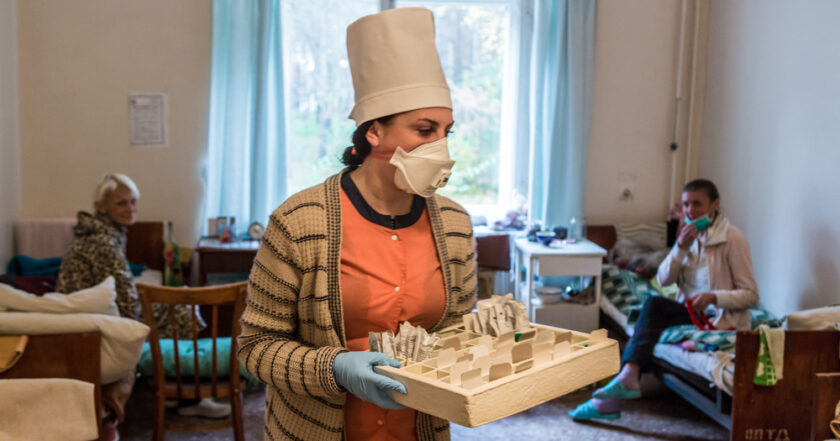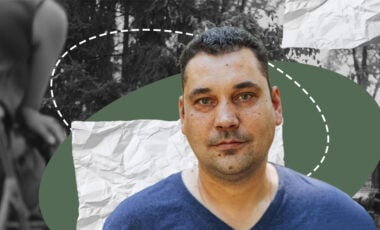As TB detection rates fall, MSF says ensuring TB care is essential to Ukraine’s COVID-19 response

Ukraine is among the countries most affected by tuberculosis (TB) in the world. TB has symptoms in common with COVID-19, and in order not to delay the identification, timely diagnosis and treatment initiation for TB, the medical humanitarian organisation Doctors Without Borders/Médecins Sans Frontières (MSF) today calls on the national health authorities to ensure that TB patients are considered a special risk category for Covid-19. To ensure patients suspected of having TB are not excluded from timely and appropriate TB diagnosis and treatment, the TB questionnaire should be included in current Covid19 screening. Both confirmed and suspected TB patients should be prioritised for free COVID-19 PCR testing and get access to early enrolment to TB care.
MSF works in partnership with the TB Dispensary in Zhytomyr region, and from April to July of this year monitored the impact of COVID-19 on the treatment of people with TB. MSF saw a drop in the continuation of existing services such as TB testing and enrolment.
"The COVID-19 lockdown posed a series of limitations to accessing TB care. Among them, health facilities considered as `non-essential' were temporarily closed or had the number of staff reduced. TB cabinets became COVID-19 testing points and medical workers were re-assigned for COVID-19, so they were not available to provide TB care. MSF has seen that the lack of transportation means in Zhytomyr also affected the ability of medical staff to go to work and patients to reach TB cabinets. Remote areas were particularly affected," describes Olena Trush, MSF's Medical Activity Manager.
Patient enrolments decreased by around 50 per cent in May in the TB pilot project in Zhytomyr oblast, which MSF runs in partnership with the Ministry of Health and the regional TB Dispensary. In response, together with the TB Dispensary, MSF called on outpatient facilities to increase TB screening and enhance tracing of previously diagnosed TB patients who had not accepted treatment. As TB doctors changed their approach in the last few months, there was a small increase in the number of patients enrolled on TB treatment but this initiative has not been widely implemented across Zhytomyr oblast. As a result, this marginal increase in enrolments is not up to expected levels and do not make up for patients with suspected TB missed in initial Covid-19 screenings.
Seven months after the pandemic was first declared, the health system in Ukraine has not fully adapted to the new reality. "When patients call their family doctors and inform them they have a cough and fever, they are only screened for COVID-19, not TB. This is a missed opportunity for TB patients to receive timely diagnosis and appropriate treatment. Their condition will only worsen, and increase the risk of spreading the disease," described Trush. "Besides incorporating the TB screening questionnaire in current Covid19 screening, prioritising free Covid19 PCR testing for suspected and confirmed TB patients and ensuring early enrolment into TB care are essential measures for the country's Covid-19 response," she added.
National data also shows a drop in the number of people diagnosed with TB since the beginning of the COVID-19 pandemic in Ukraine. When we compare statistics provided by the Public Health Center, from January to March 2020, on average 1,900 people were diagnosed with TB per month in the country. From April to June, the number of new cases dropped to around 1,200 per month. This is a decrease of almost 37 per cent. Measures to improve TB screening and treatment should be adopted in the rest of the country to ensure continuity of care for vulnerable people.
Once the first case of COVID-19 was registered in Ukraine, MSF strengthened its outpatient care activities to ensure continuity of TB care. MSF also ensured access to medicines and psychosocial support for patients with TB during the length of the declared lockdown. Trainings for health workers were also provided on infection prevention and control measures, as well as on how to cope with the psychological stress of increased workload and operating in an increased risky environment. MSF also ran a telephone hotline to provide psychological support for health workers, patients with COVID-19 and their relatives.
Background information
- Annually, around 1.5 million people die of tuberculosis (TB) worldwide and approximately 10 million people develop the disease. People living with TB are thought to be more vulnerable to COVID-19 and its consequences as their lungs are already affected and weaker. It is essential to ensure continuity of access to TB prevention, diagnosis, and treatment in our communities and healthcare settings during the COVID-19 pandemic.
- Ukraine first acknowledged the TB epidemic in 1995, and TB continues to present a major public health challenge. The latest data made available by the Ministry of Health shows that 10 people died of TB per day in Ukraine in 2018. As of August 2020, over 14,000 were on TB treatment in the country.
- Médecins Sans Frontières (MSF) is an independent, international medical humanitarian organisation active in more than 70 countries worldwide. MSF was founded in 1971 by a French doctors and journalists. It received the 1999 Nobel Peace Prize in recognition of its members' continued efforts to provide medical care in acute crises, as well as raising international awareness of potential humanitarian disasters. MSF first worked in Ukraine in 1999, and today MSF's work in the country centres around infectious diseases, as well as provide relief to people affected by the conflict. All care is free of charge. More than 6.3 million individual donors and private foundations worldwide make this possible.
- Globally MSF has been involved in TB care for 30 years, often working alongside national health authorities to treat patients in a wide variety of settings, including chronic conflict zones, urban slums, prisons, refugee camps and rural areas. Nowadays, MSF is one of the largest non-governmental providers of TB treatment in the world.





















































